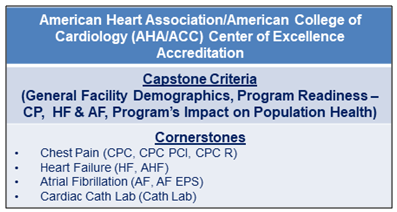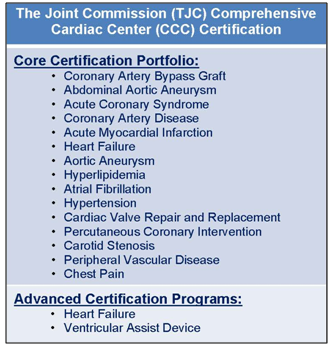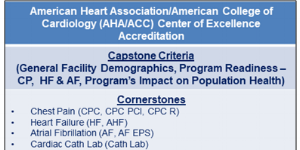Late last year, the opportunity for hospital cardiovascular (CV) programs to seek “whole program” accreditation or certification from outside validating organizations increased with announcements from both the The Joint Commission (TJC) and the American Heart Association/American College of Cardiology.
Both organizations are offering new, unique CV program accreditation and certification[i] opportunities. This blog post will briefly overview these two programs and in a future blog post we will discuss the strategic implications of accreditation.
American Heart Association/American College of Cardiology Cardiovascular Center of Excellence Accreditation (refer to: www.heart.org/cardiacaccreditation for complete descriptive information)
In November 2017, the AHA/ACC program was announced to demonstrate how CV Center of Excellence (COE) accreditation can assist hospitals becoming premier “learning healthcare systems” for the express purpose of enhancing the cardiovascular health of the population.  Accreditation standards are based on established ACC/AHA guidelines and best practices. The CV COE process is administered by AHA, and the “Cornerstones” – specialty program components (see table) are administered by the ACC. The requirements for Accreditation include a Chest Pain Center, plus two out of the three other Cornerstone services. Interested hospitals are required to complete a Readiness Assessment (RA) for equivalency and the likelihood of CV COE accreditation success and sustainability. The RA consists of hospital demographics (including capabilities, services provided and volumes), a description of the programs impact on population health, and measurement of components required for effective decision making (specifically, governance, systems of care and clinical quality). Complete instructions for applications and further detailed information can be found on their website.
Accreditation standards are based on established ACC/AHA guidelines and best practices. The CV COE process is administered by AHA, and the “Cornerstones” – specialty program components (see table) are administered by the ACC. The requirements for Accreditation include a Chest Pain Center, plus two out of the three other Cornerstone services. Interested hospitals are required to complete a Readiness Assessment (RA) for equivalency and the likelihood of CV COE accreditation success and sustainability. The RA consists of hospital demographics (including capabilities, services provided and volumes), a description of the programs impact on population health, and measurement of components required for effective decision making (specifically, governance, systems of care and clinical quality). Complete instructions for applications and further detailed information can be found on their website.
The Joint Commission Comprehensive Cardiac Center (CCC) Certification (refer to: www.jointcommission.org/facts_about_comprehensive_cardiac_center_certification for complete descriptive information)
In July 2017, The Joint Commission introduced their new CCC program, a “voluntary program for hospitals with robust cardiac care services seeking to evaluate, evolve, and elevate patient care across an extensive array of cardiac domains,” and “provides system-wide reviews and recommendations to help lift your entire organization from excellent to elite.” Comprehensive, Core and Advanced Certifications are available. Core Certification (see table) requires current TJC hospital accreditation status, meeting minimum volume standards (for data review validity purposes), use of standardized clinical practice guidelines/evidence-based practices, and the availability of a minimum of four months of data for initial review (24-months going forward). The foundational programs include three main components:
- Standards

- Clinical/practice guidelines
- Performance measures
A hospital can choose up to four non-standardized outcome measures to monitor on an ongoing basis (two clinical, two non-clinical). There are five program requirements:
- Delivering/facilitation of clinical care
- Supporting self-management
- Clinical information management
- Performance measurement
Advanced Certification is available for HF and VAD, with specific eligibility and requirements specified, including those outlined in the TJC’s Comprehensive Certification Manual for Disease-Specific Care Including Advanced Programs for Disease-Specific Care. Programs will be certified for two years, with attestations of compliance with standards due every year. Complete instructions for applications and further detailed information can be found on the website.
Implications
CFA firmly believes that the pursuit of excellence and center of excellence status is the superordinate goal for all cardiovascular programs. Because of the long-term implications associated with accreditation options, there seems little question that accreditation/certification will be on the agenda for every hospital cardiovascular program in the near future. As a developmental strategy, it has real merit and makes logical sense for many hospitals, particularly in highly competitive markets. However, this issue raises many questions that need to be answered before any commitment is made and resources, time and staffing are allocated. The foundational question becomes, “Is it good strategy?”
We will be posting additional articles regarding center of excellence development and program accreditation and certification in the near future. Specifically, we will be addressing the issue of accreditation/certification as program development strategy.
If you are interested in learning more about strategies to deal with accreditation/certification, low-volume cardiac surgery programs, programmatic assessment for cardiovascular services and/or cardiovascular program strategic planning, please contact CFA at (949) 443-4005 or by e-mail at cfa@charlesfrancassociates.com.
[i] For purposes of this discussion, we make no distinction between the use of the terms “accreditation” and “certification.”

